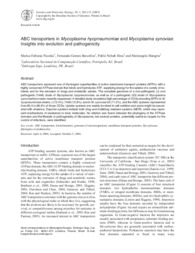ABC transporters in Mycoplasma hyopneumoniae and Mycoplasma synoviae: insights into evolution and pathogenicity.
ABC transporters in Mycoplasma hyopneumoniae and Mycoplasma synoviae: insights into evolution and pathogenicity.
Author(s): NICOLÁS, M. F.; BARCELLOS, F. G.; HESS, P. N.; HUNGRIA, M.
Summary: ABC transporters represent one of the largest superfamilies of active membrane transport proteins (MTPs) with a highly conserved ATPase domain that binds and hydrolyzes ATP, supplying energy for the uptake of a variety of nutrients and for the extrusion of drugs and metabolic wastes. The complete genomes of a non-pathogenic (J) and pathogenic (7448) strain of Mycoplasma hyopneumoniae, as well as of a pathogenic (53) strain of Mycoplasma synoviaehave been recently sequenced. A detailed study revealed a high percentage of CDSs encoding MTPs in M. hyopneumoniaestrains J (13.4%), 7448 (13.8%), and in M. synoviae53 (11.2%), and the ABC systems represented from 85.0 to 88.6% of those CDSs. Uptake systems are mainly involved in cell nutrition and some might be associated with virulence. Exporter systems include both drug and multidrug resistant systems (MDR), which may represent mechanisms of resistance to toxic molecules. No relation was found between the phylogeny of the ATPase domains and the lifestyle or pathogenicity of Mycoplasma, but several proteins, potentially useful as targets for the control of infections, were identified.
Publication year: 2007
Types of publication: Journal article
Unit: Embrapa Soybean
Keywords: Transportadores ABC
Observation
Some of Embrapa's publications are published as ePub files. To read them, use or download one of the following free software options to your computer or mobile device. Android: Google Play Books; IOS: iBooks; Windows and Linux: Calibre.
Access other publications
Access the Agricultural Research Database (BDPA) to consult Embrapa's full library collection and records.
Visit Embrapa Bookstore to purchase books and other publications sold by Embrapa.

